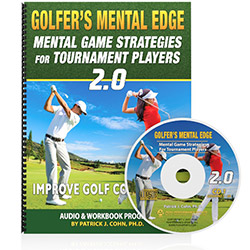How Tiger Woods Uses Pressure to His Benefit
Most athletes would agree that “pressure” does not help you perform better. However, some athletes handle pressure positively than others, and use it to win.
After winning the 2008 US Open Tiger Woods said that pressure and feeling nervous is a good thing…
How you personally interpret pressure makes all the difference in the world. Some athletes love the challenge of scoring a goal with one minute left in the game or needing to sink a free throw to win.
However, other athletes tighten up, get anxious, and worry too much about losing a game when their backs are against the wall and they feel under pressure.
After Tiger Woods won the US Open in dramatic style, a reporter asked if he felt pressure to make up a shot to tie Rocco in the last two holes of the tournament:
“Well, it’s pressure, there’s no doubt. I was nervous and that’s a good thing. That means you care. You can try and use that energy as best you can to heighten your focus and then get into the right situation and it worked out great for me this week.”
~Tiger Woods
What a revelation… Pressure is a good thing. It means you care about your sport. Pressure gives you the added adrenalin to focus your best. Wow, most athletes would cower under pressure and want to run away.
Tiger Woods’ interpretation of pressure makes all the difference. He relishes the moments that he has to sink a long putt to stay in the tournament or hit a tough shot from the rough to make birdie.
Another great athlete, Michael Jordan, said something similar to Woods. He stated that he feels nervous before a big basketball game, but once the game starts his confidence and instinct take over and he is no longer nervous at tip off.
We use many terms to describe how pressure feels such as nervous, anxious, tense, and worried about results. But most athletes do not interpret pressure the way Tiger does.
He thinks of pressure as concern, excitement, a boost of adrenalin, and enhanced focus to perform your best.
If you want to learn more about how to interpret pregame pressure as helpful to your performance and perform with a calm mind, I suggest you check out “The Relaxed Athlete,” my latest CD program:
Your Mental Game Coach,
Patrick J. Cohn, Ph.D.,
Master Mental Game Coach
p.s. After you run over to peaksports.com to read more about “The Relaxed Athlete,” you should consider becoming a member of Peaksports.com and receive 30% off every program in The Confident Athlete Series:
Related Sports Psychology Articles
- Does Jordan Spieth Have The Tiger Woods Syndrome?
- Is Tiger Woods Suffering From The Yips?
- What Motivates Tiger Woods?
*Subscribe to The Sports Psychology Podcast on iTunes
*Subscribe to The Sports Psychology Podcast on Spotify
Download a free sports psychology report to improve your mental game!
Learn more about our one-on-one mental game coaching.
Golfer’s Mental Edge

What’s the big sign that your mental game is the weak link in your golf game? When you can’t play consistently as well as when you play a practice or casual round–or your range game is way better than your game on the course. If you suffer from lack of focus, low self-confidence, poor composure or other mental game obstacles on the course, you can’t reach your true potential in golf.
The Golfer’s Mental Edge 2.0 Audio and Workbook program is ideal for any amateur, collegiate, junior, and tour professional golfer.
Golf coaches and instructors would also be wise to teach “The Golfer’s Mental Edge 2.0” principles to their players. This program is perfect for any golfer who wants to improve performance and consistency by managing their mind better on the course.

